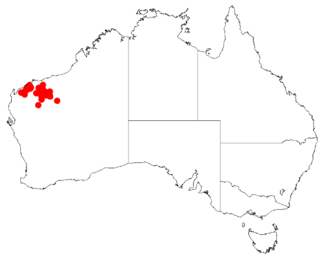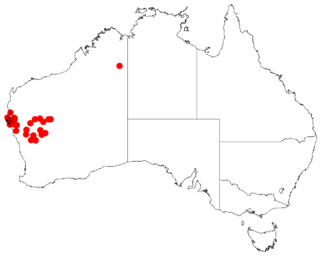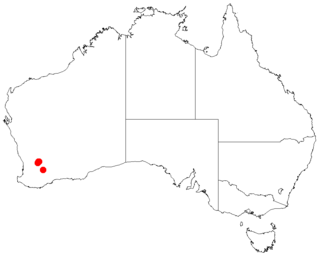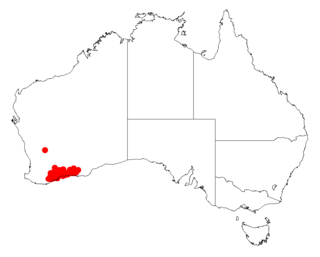
Acacia brachypoda, known colloquially as western wheatbelt wattle or Chinocup wattle, is an endangered species of Acacia restricted to a small locality in western Australia's wheatbelt.

Acacia atkinsiana, commonly known as Atkin's wattle, is a shrub belonging to the genus Acacia and the subgenus Juliflorae endemic to Australia. The indigenous peoples of the area where the shrub is found, the Kurrama peoples, know the shrub as Bilari or Pilarri.

Acacia incurvaneura, also known as narrow-leaf wattle, is a shrub belonging to the genus Acacia and the subgenus Juliflorae that is endemic to central and western Australia.

Acacia latior is a shrub belonging to the genus Acacia and the subgenus Juliflorae that is endemic to western Australia.

Acacia macraneura, commonly known as big mac wattle, is a shrub belonging to the genus Acacia and the subgenus Juliflorae that is native to arid parts of western Australia.

Acacia rhodophloia, commonly known as minni ritchi or western red mulga, is a tree or shrub belonging to the genus Acacia and the subgenus Juliflorae that is endemic to a large area of arid central western Australia. The Indigenous group the Kurrama peoples know the plant as mantaru.
Acacia leptalea, commonly known as Chinocup wattle, is a shrub belonging to the genus Acacia and the subgenus Phyllodineae that is endemic to a small area in south western Australia. It is listed as threatened according to the Environment Protection and Biodiversity Conservation Act 1999.

Acacia microcalyx is a shrub belonging to the genus Acacia and the subgenus Phyllodineae that is endemic to western Australia.
Acacia muriculata, commonly known as Koolanooka wattle, is a shrub belonging to the genus Acacia and the subgenus Phyllodineae that is endemic to a small area of south western Australia.

Acacia pusilla is a shrub of the genus Acacia and the subgenus Phyllodineae the is endemic to south western Australia.

Acacia robiniae, commonly known as Robin's wattle, is a shrub of the genus Acacia and the subgenus Phyllodineae that is endemic to south western Australia.

Acacia arrecta, commonly known as Yarnda Nyirra wattle or Fortescue wattle, is a shrub of the genus Acacia and the subgenus Plurinerves that is endemic to arid areas in north western Australia.

Acacia barrettiorum, commonly known as the Barrett's wattle, is a shrub of the genus Acacia and the subgenus Plurinerves. It is native to an area in the Kimberley region of Western Australia.

Acacia consanguinea is a shrub of the genus Acacia and the subgenus Plurinerves that is endemism to south western Australia.

Acacia cowaniana, commonly known as Cowan's wattle, is a shrub or tree of the genus Acacia and the subgenus Plurinerves that is endemic to an area of south west Australia.

Acacia lanuginophylla, or woolly wattle, is a shrub of the genus Acacia and the subgenus Plurinerves that is endemic to south western Australia. It is currently listed as a vulnerable species according to the Environment Protection Biodiversity Conservation Act 1999.

Acacia patagiata, also commonly knowns as salt gully wattle, is a shrub of the genus Acacia and the subgenus Plurinerves that is endemic to south western Australia.

Acacia pharangites, commonly known as Wongan gully wattle, is a shrub of the genus Acacia and the subgenus Plurinerves that is endemic to a small area of south western Australia and is listed as endangered according to the Environment Protection and Biodiversity Conservation Act 1999.

Acacia speckii is a shrub or tree of the genus Acacia and the subgenus Plurinerves that is endemic to a small area in central western Australia.

Acacia cretacea, also known as chalky wattle, is a shrub belonging to the genus Acacia and the subgenus Phyllodineae that is endemic to South Australia.


















